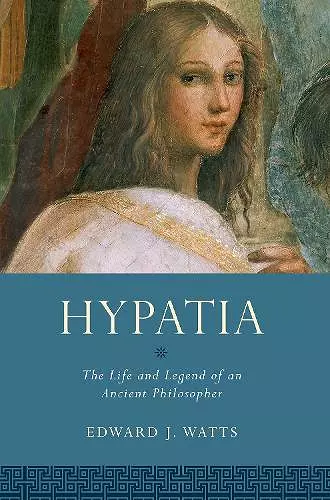Hypatia
The Life and Legend of an Ancient Philosopher
Format:Paperback
Publisher:Oxford University Press Inc
Published:15th Nov '19
Should be back in stock very soon

A philosopher, mathematician, and martyr, Hypatia is one of antiquity's best known female intellectuals. During the sixteen centuries following her murder, by a mob of Christians, Hypatia has been remembered in books, poems, plays, paintings, and films as a victim of religious intolerance whose death symbolized the end of the Classical world. But Hypatia was a person before she was a symbol. Her great skill in mathematics and philosophy redefined the intellectual life of her home city of Alexandria. Her talent as a teacher enabled her to assemble a circle of dedicated male students. Her devotion to public service made her a force for peace and good government in a city that struggled to maintain trust and cooperation between pagans and Christians. Despite these successes, Hypatia fought countless small battles to live the public and intellectual life that she wanted. This book rediscovers the life Hypatia led, the unique challenges she faced as a woman who succeeded spectacularly in a man's world, and the tragic story of the events that led to her tragic murder.
The book is written in a readable style, without sacrificing rigor or intellectual transparency. The research is thorough. References and details are put in end notes ordered by chapter, easily accessible to the interested reader without disturbing the text ow. I can recommend this book to university students as well as to the general reader interested in late Roman philosophy or in the life of one of the few known female philosophers from before modern times. * Christian Bennet, Mathematical Reviews *
This monograph is undoubtedly an important addition to the scholarship on Hypatia, not least because there has been no monograph-length study for more than two decades. Arguably one of the most significant contributions of this study is the argument that the murder of Hypatia was not, as is often argued in the existing scholarship, a pre-meditated attack but rather a circumstantial event. Apart from Hypatia's life, this book is also notable for painting a detailed picture of late-antique Alexandria and for showing how much information about an ancient figure can be teased out of indirect evidence about historical circumstances, parallel cases and similar. The writing style is extremely accessible. Quite a few comparisons to modern history and popular culture-although almost exclusively American-make the book very approachable to a wide range of audiences, not only the specialists. * Aiste Celkyte, "Bryn Mawr Classical Review" *
Watts' account of Hypatia's life is a work of scholarship, the product of some very thorough research, which provides a detailed and plausible interpretation of the life of a fascinating woman ... I would recommended this book for a university rather than school library, though it might have an appeal for a school pupil with an interest in studying prominent female figures in antiquity ... It is also a book for the thoughtful reader who wishes to examine their own beliefs about how to live the good life and its compatibility with public life. * Alison Henshaw, Classics for All *
Watts is most compelling in the summations of his findings and narratives...A careful historical portrait of one of antiquity's most accomplished women. * Steve Young, Library Journal *
To shine as a mathematician; to alter decisively the teaching curriculum of an ancient university; to work for the peace of an explosive city: Hypatia of Alexandria had done all this before her senseless murder by a Christian mob in 415 CE. With zest and exemplary scholarship, Ed Watts has brought alive the vivid world of Alexandria that both made Hypatia's achievements possible and also led to her unexpected, shocking death. It is a book that shows that truth is stranger (and a lot more interesting) than the rose-tinted fiction which has usually enveloped the life and death of this remarkable woman. * Peter Brown, Princeton University *
Hypatia of Alexandria led an exceptional life as a celibate teacher of philosophy and political adviser. Edward Watts uses his expert knowledge of her city, and of late antique education, to explain the content and context of her teaching, and to show how Alexandria made possible both her career and her appalling death. Hypatia's death made her a symbol of repression, but for her, philosophy was a way of life, and that is the focus of this excellent book. * Gillian Clark, University of Bristol *
Immersing Hypatia into her world of competing philosophers, jockeying bishops and local potentates, loyal students and rival monks, Watts restores the brilliant mathematician and philosophical leader, a woman all but submerged under the mask her violent death created. In the process, he also evokes the fabric of cosmopolitan late Roman Alexandria, a city in which Christians and others coexisted despite tensions that could and did erupt into moments of spectacular violence. * Susanna Elm, University of California, Berkeley *
ISBN: 9780190073701
Dimensions: 155mm x 231mm x 15mm
Weight: 318g
224 pages